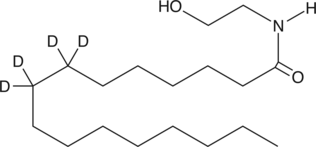Description
An internal standard for the quantification of PEA by GC- or LC-MS.
Formal name: N-(2-hydroxyethyl)-hexadecanamide-7,7,8,8-d4
Synonyms: Palmidrol-d4|PEA-7,7,8,8-d4
Molecular weight: 303.5
CAS: 1159908-45-8
Purity: ≥99% deuterated forms (d1-d4)
Formulation: A solution in ethanol
Application|Mass Spectrometry||Product Type|Biochemicals|Analytical Standards||Product Type|Biochemicals|Isotopically Labeled Standards|Deuterium||Product Type|Biochemicals|Lipids|Fatty Amides||Research Area|Immunology & Inflammation|Allergy||Research Area|Lipid Biochemistry|Endocannabinoid/Endocannabinoid-like||Research Area|Neuroscience|Cannabinoid Research|CB1 & CB2 Receptors||Research Area|Neuroscience|Cannabinoid Research|Endocannabinoids



